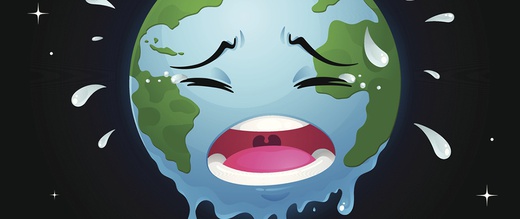The views expressed in our content reflect individual perspectives and do not represent the official views of the Baha'i Faith.
The world is becoming a more dangerous place.
With a loss of shared values, the rise of unpredictable leaders, the increasing concentration of wealth and power, the rejection of science, logic, expertise and even truth, increasing xenophobia and polarization, a disregard for the needs and desires of the young and of future generations, the headlong destruction of environmental resources and life-support systems, the destabilization of the climate, and a debt-driven economic and financial system raping the planet for short-term profit, these contrary winds are sweeping away many hopeful signs of progress, and seem to be leading us to a catastrophe of multiple dimensions and unimaginable consequences. The parallel with the 1930s is frightening.
 Just for a moment, let’s reflect on the moral dimensions of corruption, particularly in the light of recent political events. Corruption is traditionally defined as the abuse of public office for private gain, including bribery, nepotism and misappropriation; extra-legal efforts by individuals or groups to gain influence over the actions of the bureaucracy; the collusion between parties in the public and private sectors for the benefit of the latter; and more generally influencing the shaping of policies and institutions in ways that benefit the contributing private parties at the expense of the broader public welfare.
Just for a moment, let’s reflect on the moral dimensions of corruption, particularly in the light of recent political events. Corruption is traditionally defined as the abuse of public office for private gain, including bribery, nepotism and misappropriation; extra-legal efforts by individuals or groups to gain influence over the actions of the bureaucracy; the collusion between parties in the public and private sectors for the benefit of the latter; and more generally influencing the shaping of policies and institutions in ways that benefit the contributing private parties at the expense of the broader public welfare.
But on reflection, the corruption eating into the vitals of global society today is more than just the material corruption of bribery for personal gain. It is any undue preference given to personal or private gain at the expense of the public or collective interest, including the betrayal of a public trust or office in government. It is also the manipulation of a corporate responsibility for self-enrichment, the distortion of truth and denial of science to manipulate the public for ideological ends, and even the misuse of a religious responsibility to acquire power and wealth. Corruption is just one expression of the priority given to oneself over others, of egoism over altruism, of personal over collective benefit.
We often underestimate the impact of corruption on environmental destruction and mismanagement because, as an illegal activity, it escapes from statistics—but it causes the failure of many efforts at environmental protection and management, whether from traffic in endangered species, illegal logging and fishing, and ignoring or evading environmental regulations.
As a systems scientist, it seemed clear to me that there must be a simple underlying systems explanation for all of this. Like the struggle between good and evil, it is nothing new, but it is expressed in complex new forms—which all begin with human morality.
Morality starts with the nature and purpose of human beings. We are born with an animal nature and the potential for much more, a potential realized through education, an education with material, intellectual and ethical/moral/spiritual dimensions. Without the right education, our ego and selfish desires dominate, our lives driven by self-interest and physical passions. It is perfectly natural to be selfish and aggressive, and for many, “you can’t change human nature.” Corruption is an expression of this, as are war, crime, dictatorships and the many other ways that self-interest expresses itself today.
Here’s the problem: Every civilization in which these forces of disintegration become dominant has eventually collapsed.
Self-centeredness in all its forms has become the ideology for self-justification behind the conservative movements of today—whether in the neoliberal economy that drives the concentration of wealth and power; political ideologies of total individual freedom that reject any constraints or regulations in the common interest; national sovereignty that leans to isolationism and self-protection behind strong borders; xenophobia that places one ethnicity or culture above all others; multinational corporations for which the right to profits overrides all other interests; and even criminal syndicates for which illegal activities form the fastest route to money and power. These ideologies forget that Adam Smith’s “invisible hand” of self-interest was initially balanced by an individual sense of moral responsibility. They assume that the larger good will somehow “naturally” emerge or trickle down from all these selfish drives, while in practice they only serve to entrench the rich and powerful.
Ironically, human beings have the capacity for much more, as the history of the rise of civilizations has repeatedly demonstrated. Education is what allows culture, science, innovation and social cohesion to develop. It cultivates all the potentials available in each individual—whether the physical capacity for athletic performance or feats of endurance, the intellectual capacity for rational thought, scientific investigation and cultural creation, the emotional capacity for altruism, empathy, solidarity and cooperation, or the spiritual capacity for love, humility, forgiveness, volition, generosity, and self-effacement—into a higher collective entity. All these dimensions of education complement and mutually reinforce each other, and neglecting any of them can lead to undesirable outcomes.
Fundamental to all of this is the shared morality on which any society must be built, with values that contribute to social cohesion, favor unity in diversity and leave no one behind. Education transmits those values and ensures the sustainability of the society. Today, those values are receding.
The Baha’i international governing body, the Universal House of Justice, so well describes these:
…multiplying ills of a disordered society. Over the last year, it has become clearer still that, in different nations in different ways, the social consensus around ideals that have traditionally united and bound together a people is increasingly worn and spent. It can no longer offer a reliable defense against a variety of self-serving, intolerant, and toxic ideologies that feed upon discontent and resentment. With a conflicted world appearing every day less sure of itself, the proponents of these destructive doctrines grow bold and brazen. We recall the unequivocal verdict from [Baha’u’llah]: “They hasten forward to Hell Fire, and mistake it for light.” Well-meaning leaders of nations and people of goodwill are left struggling to repair the fractures evident in society and powerless to prevent their spread. The effects of all this are not only to be seen in outright conflict or a collapse in order. In the distrust that pits neighbor against neighbor and severs family ties, in the antagonism of so much of what passes for social discourse, in the casualness with which appeals to ignoble human motivations are used to win power and pile up riches—in all these lie unmistakable signs that the moral force which sustains society has become gravely depleted. – Message to the Baha’is of the World, April 2015.
You May Also Like
Comments

















We are all human, we all make mistakes, so why don't people admit their mistakes and do their best to rectify and or apologise?
Sadly this attitude is teaching our younger generation to follow suit! ...Excellent post and I thank you.
Who are those who support demagogues? Do they not also see the dangers? Is it worth the effort of financial reward? Is life about people, or profit? Our entire State Dept is about people, and they are about to be dismissed of their value.
I would like to recommend the web site weatheringthestorm.net. The author has presented a course on the topic at University of Michigan, and (with his permission) I will be presenting it at Casper College in March. I asked the program administrator if I could add a section on the importance of religions to environmental and sustainability values, but was told it is not OK. ... Oh well, we do what we can.
I would like to recommend the web site weatheringthestorm.net. The author has presented a course on the topic at University of Michigan, and (with his permission) I will be presenting it at Casper College in March. I asked the program administrator if I could add a section on the importance of religions to environmental and sustainability values, but was told it is not OK. ... Oh well, we do what we can.
I would like to recommend the web site weatheringthestorm.net. The author has presented a course on the topic at University of Michigan, and (with his permission) I will be presenting it at Casper College in March. I asked the program administrator if I could add a section on the importance of religions to environmental and sustainability values, but was told it is not OK. ... Oh well, we do what we can.